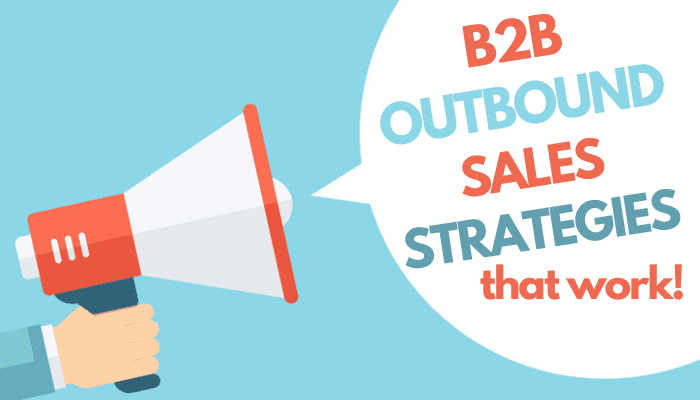If your outbound sales process isn’t working, or maybe you’re thinking of placing an effort in a priority around building an outbound B2B sales process, then you’ll want to dive into this post and watch the entire video.
We’ll share the key strategies you need to deploy in order to ensure that your outbound sales strategy leads to rapid sales results.
What is Outbound Sales?
(0:56)
Outbound sales is putting the people, processes, and technology in place to reach outwardly for customers rather than waiting for them to come into you (commonly known as inbound sales).
You might be thinking, well, I think I already have that. And maybe you do, if you have some external sales reps, for example, that simply sell external to your company and bring you customers, that is really a form of outbound sales.
Where outbound sales really becomes lucrative, is when you put professionals in place that have all of the information in front of them to allow them to reach out constantly.
You’re giving your outbound sales team the leads. You’re feeding them opportunities that they can pursue and you put a compensation model in place that pays for their performance.
That’s why outbound sales is so powerful.
In this post, I share the strategies you need to deploy to put an outbound sales process in place, that it works the way you intend it to.
If you want an effective outbound sales team, the first step you need to do is to be crystal clear on who your buyer is.
B2B Outbound Sales Strategies: 5 Steps to Success
1. Define Your Ideal Buyer
 (2:01)
(2:01)
This might seem kind of obvious here, but more often than not, I find that a lot of organizations don’t fully define who it is that their outbound sales team should be pursuing.
Now you might provide them with a list of leads. (We’ll talk about that in a moment. If you’re not, you should be.) Here’s a few things to consider:
Within those leads, if they’re companies, for example, which are the companies they should go after first? Are you pursuing large companies? Or, are you pursuing small companies? There’s an important distinction that we’ll talk about in the second point.
For large companies or small companies, define within the company:
- Who is the key decision maker?
- What’s the title of that individual?
- Who are the influencers of those decisions?
You see, the more information you can give your outbound sales team relative to who it is they’re pursuing the better chance they’re gonna find that person and go after them versus spending a lot of time with other people in the organization that simply can’t buy from them.
2. Create Multiple Value Propositions
 (3:02)
(3:02)
As I alluded to it in the previous section, depending on who you’re pursuing or who you expect your outbound sales team to pursue, you may want to create multiple value propositions.
(Sound a little bit crazy? Hear me out!)
When it comes to the value that your product or service offers, that’s probably pretty clear to you.
However, if you are to pursue or to have your outbound sales team pursue large and small companies, the title of the buyer in each company may be different. Most importantly, the value to each company may be different.
For example, if you try to sell software to a smaller company, you’ll probably have to deal with the president or CEO of the organization.
When it comes to making an investment in your software, they’re really making a decision relative to them personally. They consider something like, “Am I going to give up my vacation money for this investment in software or not?” Their decision to buy is very much a personal decision.
So how you approach the value proposition is going to be very different, depending on the relative size of the company.
If you’re to contact somebody in a mid-size company or even a large company where it’s probably not the president, it’s an executive. That executive has a budget, but that budget is not their personal money. It’s money that they’ve been designated to do what they need to do.
That decision is less personal and is more based on the business objectives that they’re seeking.
For that reason, the value proposition may change depending on the size of the company or the title of the individual you’re pursuing in different companies.
So consider those companies you’re going after that, we’ve defined in strategy #1. Ask yourself, are there some different value propositions that I can equip my outbound sales team with to make sure they’re successful?
3. Educate Your Sales Team
 (5:10)
(5:10)
When it comes to your outbound sales team, whether these are employees or you’ve brought in outbound sales reps for your outbound sales team, you’ll want to educate them.
What I find a lot of companies do is that they find people who are “experts” in outbound sales. They hire them through contract or otherwise, and then they let them loose. They give them the presentation deck, maybe do a quick little meeting on what their product or service is and, and let them go.
The problem that creates is that we’re not really educating them fully on exactly who our buyers are, where they’re located, or what we want from them. Most importantly, they’re not in a great position to be able to speak to the value propositions that we’ve already developed.
Spend a little bit of time educating them on our company, our culture, the size of our organization, the kinds of people that get involved.
The more information that your outbound sales team has relative to your company, your product, your service, your value, and specific to the people they’re pursuing the better equipped they are to make the sale.
Think about it. You don’t want to have them waste any time on trying to reach the right person or miss out on opportunities. You see, once you’ve tried to convert a buyer and it hasn’t worked, you can’t go back very soon. Can you? You’re missing these opportunities.
Educate your new outbound sales reps on
- your company,
- your products,
- your services,
- your culture, and
- everything you can to make sure they’re fully equipped.
You should treat them no different than if they were a new employee coming into your sales department.
This may seem like a little bit of a challenge upfront, especially if you have a pay-for-performance model.
Keep in mind the value in it for them and for you: The more they know initially, the faster they can get up to speed. Which means more sales for them and more sales for you.
4. Generate Quality Leads
 (6:54)
(6:54)
The next strategy to deploy with your outbound sales team that’ll ensure they’re as effective as possible is to generate quality leads for your outbound sales team.
A lot of organizations get an outbound sales team together, and then they leave the lead generation and lead qualification up to the team.
But you’re burning daylight and wasting money there, right? This is not where you want them spending their time.
You want them spending their time and making calls and closing deals.
You might say, okay, I do have some leads that I funnel over to my outbound sales team. Great, but what’s the quality of those leads?
I know organizations that set up social media marketing to generate leads. The problem is the leads themselves. Half of them are garbage: It’s people just clicking around. Not really sure what they’re looking at, not really a decision maker, not really a buyer.
All of those names and information goes to the outbound sales team, who ends up spending at least 50% of their time scrubbing the list. They call people on the list, just to find out that they’re not a decision maker and they have no influence.
Make sure that you generate high-quality leads for your outbound sales team so that their time and energy is spent on doing what you want them to do, which is reaching out to decision makers and trying to sell them your product or service.
5. Closely Manage Your Team’s Performance
 (8:15)
(8:15)
The last strategy that I want to share with you to ensure your outbound sales is as effective as possible is to manage the performance of your outbound sales team closely.
A lot of organizations tend to hire some outbound sales folks or bring on some reps. They have an initial conversation, share the slide deck with them and then let them go. That’s a problem.
Stay close to your outbound sales team, especially in the early days to see how they’re doing. Evaluate:
- How many calls are they making?
- What’s their closing ratio on those calls, or at least
- What’s their conversion rate from cold call to warm presentation?
Stick close and set up some key measurables for performance, things like
- number of calls made,
- conversions from call to presentation,
- conversions from presentation to proposal to a client or customer.
Identify the key stages in your outbound sales process and then set up measures and monitor them closely, and have regular communications with your reps.
Don’t assume just because they’re doing this for other companies that they’re an expert and you don’t need to worry about them.
Too many times I’ve seen companies let their outbound sales team go for it. Three months later, they’re letting them go because they realized they didn’t really understand their product or market that well.
Invest In Your Outbound Sales Team for Better Performance
The more time you invest upfront the better. But monitor their progress closely based on setting up some key measures so that you know exactly where they’re at. And then you can invest time early on.
Remember, even if your outbound sales reps are compensated through a pay-for-performance type model, you can still invest time to help them be more successful.
Because in the end, that’s a win-win! The more successful they can be, the more successful you will be with making sales.
© Shawn Casemore 2022. All Rights Reserved.


Share This Article
Choose Your Platform: Facebook Twitter Google Plus Linkedin